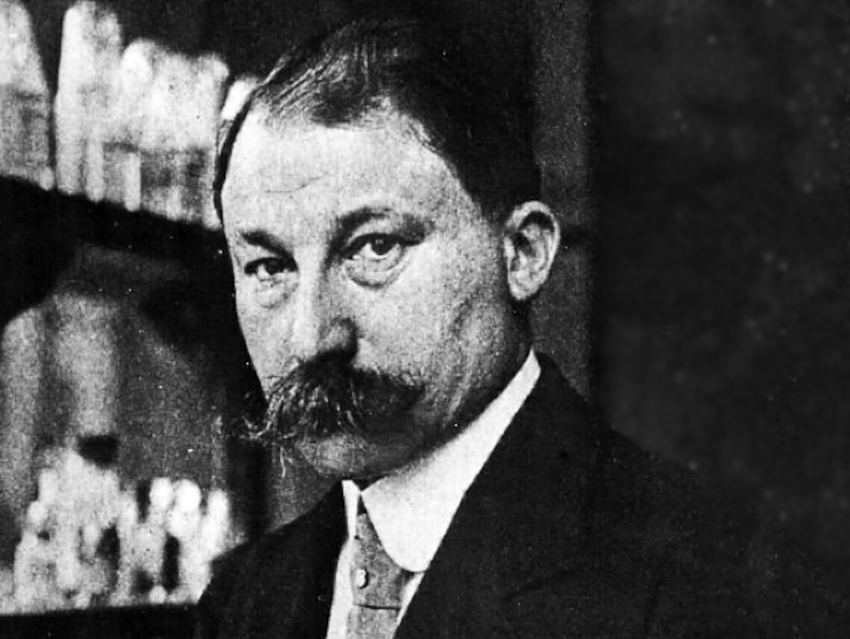François Auguste Victor Grignard was born on May 6, 1871, in Cherbourg, France. He first studied mathematics at the Ecole Normale Speciale, Cluny, France, a preparatory school for secondary-level teachers, starting in 1889. Two years later, this institution closed and Grignard was transferred to the Faculté des Sciences in Lyon, France, where he aimed for a degree in mathematics (Licence es sciences mathematiques), but failed his examinations on the first try. Grignard then completed a year of military service. In 1893, he returned to Lyon to try again for the mathematics degree, which he received in 1894.
Although Grignard preferred mathematics to chemistry at the time, he accepted a post as Assistant Preparator (préparateur adjoint) in general chemistry at the Faculté des Sciences in Lyon in December of 1894. In 1898, he became Research Leader (Chef des travaux pratiques) in general chemistry there and obtained a degree in the physical sciences (Licence es sciences physiques). After a short stint in 1905 as Lecturer (maître de conférences) at the University of Besançon, France, Grignard returned to Lyon as maître de conférences for general chemistry. He was promoted to Assistant Professor in 1908. In 1909, he was appointed Honorary Professor (charge de cours) for organic chemistry at the University of Nancy, France, and one year later, he was promoted to Full Professor there.
In World War I (1914–1918), Victor Grignard first served in the army and then as a research scientist working for the military. Among other work, he studied chemical warfare agents at Sorbonne University, Paris, France. After the war, he first returned to his position in Nancy, and then became Professor for general chemistry in Lyon in 1919. In 1921, Grignard was named Director of the Higher School of Industrial Chemistry (l’Ecole de Chimie Industrielle) in Lyon, and in 1929, he was appointed Dean of the Faculté des Sciences in Lyon, a position that he occupied until his death. Victor Grignard died on December 13, 1935, in Lyon.
Victor Grignard is best known for his work on the eponymous Grignard reagents and the Grignard reactions, which can be used to form C–C bonds. In 1900, Grignard worked under the supervision of Philippe Barbier in Lyon, who had developed a reaction of methyl iodide with ketones in the presence of magnesium to give tertiary alcohols. Grignard was tasked with optimizing the reaction conditions.
He found that magnesium alkyl halides (R–Mg–X, now known as Grignard reagents) could be prepared by heating a mixture of magnesium turnings and alkyl halides in dry ethyl ether. These reagents could then be used as nucleophiles in C–C bond-forming reactions with carbonyl compounds—i.e., in Grignard reactions. In 1901, Grignard published his doctoral thesis on these “mixed organomagnesium compounds” and their use in organic synthesis (“Sur les combinaisons organomagnesiennes mixtes et leur application à des synthèses d‘acides, d‘alcools et d‘hydrocarbures”). This discovery caused a boom in organometallic chemistry in the following years.
The Nobel Prize in Chemistry 1912 was divided equally between Victor Grignard “for the discovery of the so-called Grignard reagent, which in recent years has greatly advanced the progress of organic chemistry” and fellow Frenchman Paul Sabatier for his work on the hydrogenation of organic compounds in the presence of metals. Grignard stated that he would have preferred to share his part of the prize with Barbier.
Victor Grignard is the answer to Guess the Chemist (113).
Sources
- Victor Grignard: Ancestor of Organic Synthesis,
B. T. Newbold,
Can. Chem. News, October 2001. - François Auguste Victor Grignard,
J. Wisniak,
Educ. Química 2018, 15, 425.
https://doi.org/10.22201/fq.18708404e.2004.4.66168 - Philippe Barbier (1848–1922) and Victor Grignard (1871–1935): Pioneers of Organomagnesium Chemistry,
Synform 2018, 10, A155–A159.
https://doi.org/10.1055/s-0037-1609793
Selected Publications
- Sur l’Acétylbutyrate d’Ethyle β-Isopropylé et les Acides Diisopropylhexène Dioïques Stéréoisomères (in French),
V. Grignard, P. Barbier,
Compt. Rendus 1898, 126, 251–254. - Sur un Nouvel Hydrocarbure Hexavalent, le Methylhexènine-2.3.5 (in French),
V. Grignard,
Bull. Soc. Chim. Fr. 1899, 21, 574–575. - Sur Quelques Nouvelles Combinaisons Organométalliques du Magnèsium et Leur Application à des Synthèses d’Alcools et d’Hydrocarbures (in French)
V. Grignard, M. H. Moissan,
Compt. Rendus 1900, 130, 1322. - Sur les Combinaisons Organomagnésiennes Mixtes et Leur Application à la Synthèse d’Acides, d’Alcools et d’Hydrocarbures (in French),
V. Grignard,
Doctoral Thesis, Lyon, July 1901. - Sur les Acides Camphane-Carboniques Stéréoisomères (in French)
P. Barbier, V. Grignard,
Bull. Soc. Chim. Fr. 1914, 15, 26–37.




